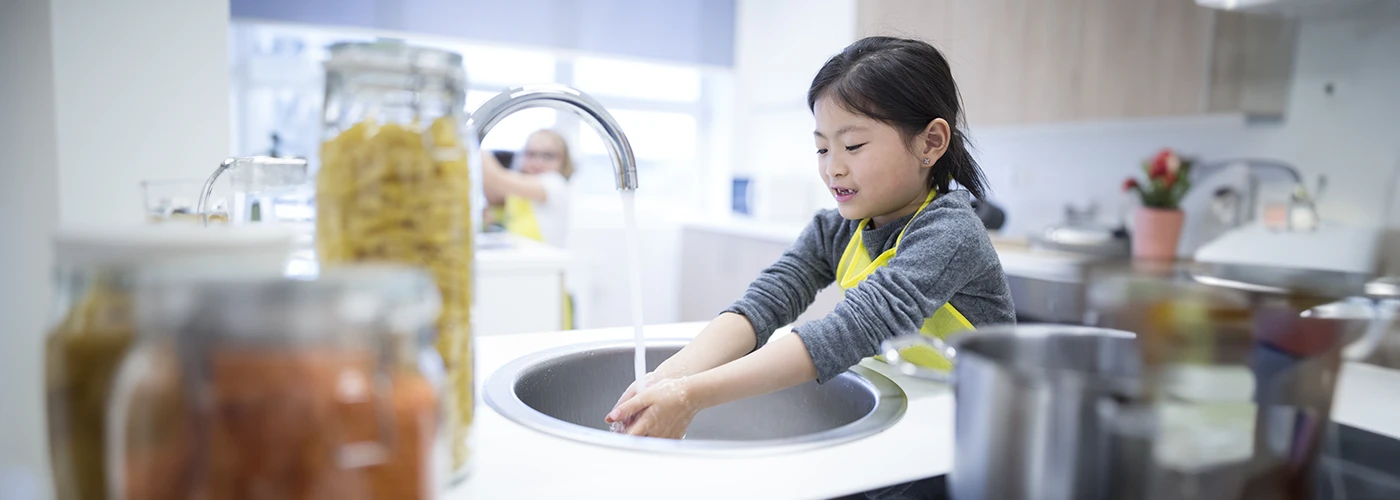Topics
Importance of handwashing
Proper hygiene, including regular handwashing, plays a significant role in reducing the transmission of harmful bacteria and germs, minimising the risk of infections, and preventing various childhood illnesses such as respiratory infections, gastrointestinal illnesses, and skin infections.
Handwashing is a scientifically proven method for removing germs and preventing illnesses. Studies suggest that washing hands reduces the risk of respiratory infections by 20% and diarrheal diseases by 30%.
Using soap and water creates a mechanical action that dislodges and suspends microorganisms, making it a simple yet crucial practice for significantly reducing the spread of infectious diseases. Soap molecules break down the fats and proteins in germs, facilitating their removal when hands are washed.
Handwashing is particularly critical after using the restroom, before eating, and after coughing or sneezing. Adequate time spent on handwashing is crucial for effective germ removal. The Centers for Disease Control and Prevention (CDC) recommends washing hands for at least 20 seconds.
Techniques and steps of proper handwashing
Understanding the science behind handwashing and following appropriate techniques is essential. To ensure effective handwashing, follow these specific steps:
|
Step 1 |
Place your hands under running water, either warm or cold. |
|
Step 2 |
Apply soap and lather well, covering your palms, the backs of your hands, between your fingers, and under your nails. |
|
Step 3 |
Scrub your hands for a minimum of 20 seconds to ensure thorough cleaning. |
|
Step 4 |
Rinse your hands thoroughly with running water. |
|
Step 5 |
Dry your hands using a clean towel or an air dryer. |
|
Step 6 |
Turn off the faucet using a towel or your elbow, particularly in public restrooms. |
Effective tips for teaching children about hygiene and handwashing
Parents and caregivers need to understand that children often mimic the behaviour of adults. Therefore, parents and caregivers can set an excellent example and be role models by consistently practicing proper handwashing and good hygiene habits. When children see adults taking hygiene seriously, they are more likely to follow suit and adopt these practices themselves.
Children often learn best when they are engaged and having fun. To make handwashing and hygiene practices enjoyable, parents and educators can use colourful soap, sing songs, or turn the process into a game. This approach not only reinforces the importance of hygiene but also makes it a positive experience for children, encouraging them to participate willingly.
Using age-appropriate materials, such as books, videos, and interactive tools, can help children understand germs and how they can make them sick. These resources can explain the importance of handwashing in simple terms that are easy for children to grasp, making the learning process more effective.
By incorporating hygiene education into daily routines, parents and educators can help children develop lifelong habits that protect them from common illnesses. Integrating hygiene and handwashing into daily activities, such as before meals, after using the restroom, and after playing outside, can make these practices a regular part of a child's routine. Consistency is key to instilling good hygiene practices.
Visual reminders like charts or stickers can be used to track and reward children’s handwashing efforts. Positive reinforcement can motivate children to develop a lifelong habit of good hygiene. By acknowledging and celebrating their efforts, parents and educators can encourage children to continue practicing good hygiene and making it a natural part of their daily lives.
Make an appointment at Gleneagles Hospitals
Educating children on the importance of handwashing and proper hygiene practices is essential for promoting their health and well-being. Prevention is key, and regular check-ups can further ensure the well-being of your loved ones. By instilling these practices from a young age, we can positively impact public health and reduce the prevalence of infectious diseases.
Get in touch with us to book an appointment today for a consultation, or visit our Paediatric Care Department at your nearest Gleneagles Hospital.








